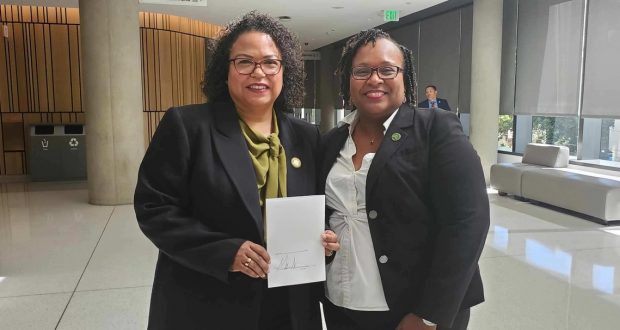By Joe W. Bowers Jr. | California Black Media
In 2024, the 12-member California Legislative Black Caucus (CLBC), introduced nearly 600 bills aimed at improving the lives of all Californians, many with a particular focus on addressing inequities faced by Black citizens. Of these bills, Gov. Gavin Newsom signed 230 into law and vetoed 50. The remaining bills either failed to pass out of committee, were rejected in one of the chambers, or were withdrawn by their authors for possible re-introduction later.
CLBC’s legislative victories reflect their commitment to creating a more equitable California for Black residents across areas like education, healthcare, housing, and criminal justice reform. The following are some of the key bills taking effect on Jan. 1, 2025.
Education Reform for Black Students
Senate Bill (SB) -1348 by CLBC vice-chair Sen. Steven Bradford (D- Inglewood) designates California Black-Serving Institutions (BSIs), a groundbreaking effort to provide additional resources and support to higher education institutions that primarily serve Black students. This bill will help ensure that Black students have access to culturally relevant and equitable educational opportunities.
Assembly Bill (AB)-51 by Assemblymember Mia Bonta (D-Oakland) makes sure that Black families from low-income communities have access to critical early childhood education.
AB-1113 by Assemblymember Kevin McCarty (D–Sacramento) expands the California Longitudinal Pupil Achievement Data System (CALPADS) to include data on expanded learning opportunity programs. This bill improves the state’s ability to track student outcomes and offer targeted support to underrepresented students, including Black students, addressing systemic inequities in the education system.
Health and Human Services: Improving Health Outcomes for Black Californians
AB-2319 by CLBC chair Assemblymember Lori Wilson (D– Suisun City) mandates implicit bias training for healthcare providers, addressing disparities in maternal and infant health outcomes, especially affecting Black women.
AB-3059 by Assemblymember Akilah Weber (D–La Mesa) requires commercial health plans to cover medically necessary pasteurized donor human milk for infants in neonatal intensive care units (NICUs). This bill also simplifies the process for hospitals to distribute donor milk by removing the need for a tissue bank license, ensuring that families, particularly in Black communities where infant mortality rates are disproportionately high, have access to life-saving nutrition for their newborn.
Tackling the Job Security
Job security is a critical issue for Black Californians, and the CLBC introduced several bills addressing these challenges. SB-1089 by Senator Lola Smallwood-Cuevas (D–Los Angeles) requires grocery stores and pharmacies to provide advance notice to workers and the community before closures, addressing the issue of food deserts and limited access to essential services in vulnerable communities.
AB-647 by Assemblymember Chris Holden (D–Pasadena) strengthens grocery worker protections by preventing mass layoffs and ensuring that trained and skilled grocery store and pharmacy workers are rehired. This bill supports job security for workers in essential sectors and helps maintain consistency in food safety and pharmaceutical access in their communities.
Environmental Justice for Black Neighborhoods
Bonta’s AB-2851 mandates air quality monitoring near metal shredding facilities, protecting the health of Black communities often located near industrial areas from harmful pollutants.
Bradford’s SB-1130 prevents low-income Black families from being left out of the Family Electric Rate Assistance (FERA) program, which helps subsidize electricity costs. It would also require the state’s three largest investor-owned utilities to report on enrollment of customers in the FERA program.
Criminal Justice and Civil Rights Advocacy
Criminal justice reform remains a top priority for the CLBC given the overrepresentation of Black individuals in California’s criminal justice system. AB-1986 by Assemblymember Issac Bryan (D–Ladera Heights) bans certain books in state prisons, addressing concerns over materials that perpetuate racial stereotypes and divisive ideologies.
AB-3089 by Assemblymember Reggie Jones-Sawyer (D–South Los Angeles) issues a formal apology for California’s role in chattel slavery, calls for systemic reforms and reparative justice for Black Californians. This bill was a key component of the CLBC’s reparations package.
AB-2975 by Assemblymember Mike Gipson (D–Compton) known as the Secure Hospitals for All Act, focuses on increasing hospital safety by requiring the installation of weapon detection systems at key entrances, such as those for Labor and Delivery and Emergency Departments. The bill aims to reduce workplace violence in hospitals, which disproportionately affects healthcare workers, including many from Black communities
AB-672 by Assemblymember Corey Jackson (D – Moreno Valley) would ensure that Black Californians and other underrepresented communities are able to alert authorities in a timely way regarding alleged violations of civil rights. This bill enhances the state’s civil rights enforcement capability and provides service and support to affected constituents.
Economic Justice and Worker Rights
Economic justice is still a pressing issue especially as Black Californians continue to face higher unemployment rates and economic disparities. Bradford’s SB-1177 ensures that minority-owned businesses, including Black-owned businesses, are prioritized for public utility contracts, helping to create more economic opportunities for Black entrepreneurs.
AB-1 by Assemblymember Tina McKinnor (D-Inglewood) strengthens collective bargaining rights for workers in the California Legislature, protects Black employees, and ensures they are given equal opportunities to advocate for fair treatment and wages.
A Continued Fight for Equity
The 230 CLBC bills signed into law represent tangible progress in education, healthcare, housing, environmental justice, and criminal justice reform.
As the CLBC looks ahead to the next legislative session, Black Californians can expect continued advocacy on the issues that matter most to their communities, with a clear focus on equity, social justice, and economic empowerment.
 Westside Story Newspaper – Online The News of The Empire – Sharing the Quest for Excellence
Westside Story Newspaper – Online The News of The Empire – Sharing the Quest for Excellence





